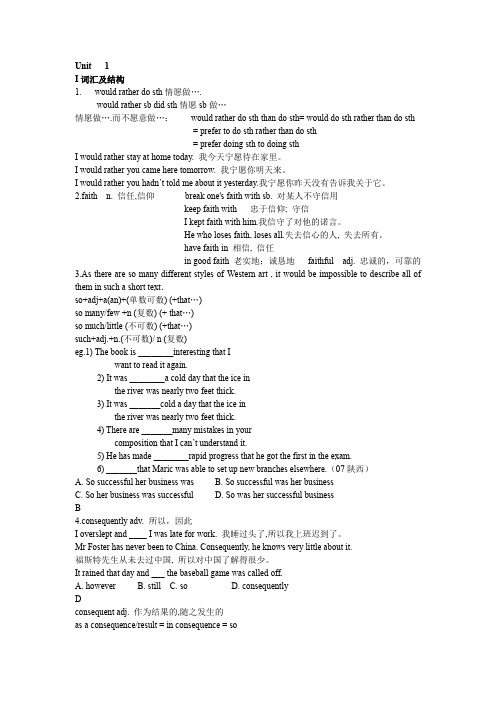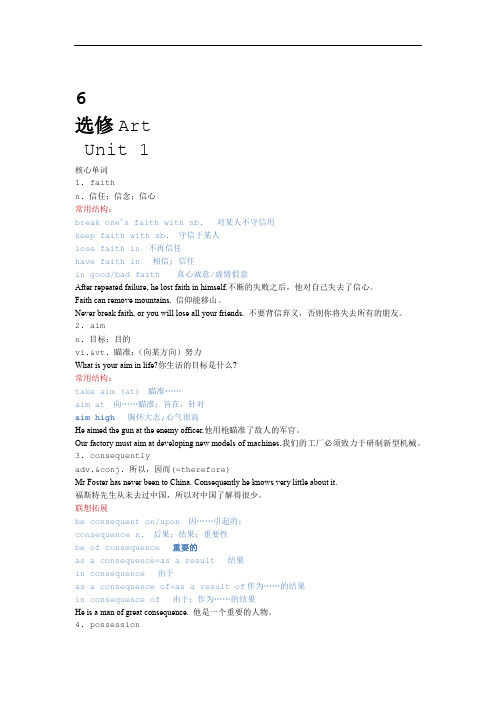人教版高中英语【选修六】[知识点整理及重点题型梳理] 动词-ing形式复习
人教版版高中英语选修六重点语法汇总

选修6重点语法汇总Unit1虚拟语气的用法虚拟语气表示一种假设的情况,或一种主观的愿望,即动词所表示的动作或状态并非事实,或不可能实现。
英语虚拟语气的形式有下列几种:一、虚拟语气用于条件状语从句注意:主句中的should通常用于第一人称,would可用于任何人称,同时也可根据意思用情态动词could, might等代替should, would。
1.与现在事实相反If had the time, John would make a trip to China to see the Great Wall.If I were you, I would give up drinking immediately.2.与过去事实相反If I’d known that it was going to rain, I wo uld never have gone for a walk in the country.3.与将来事实相反If it were to/should rain tomorrow, the meeting would be put off.If you went there next time, you would see what I mean.4.错综时间虚拟语气当条件状语从句表示的行为和主句表示的行为所发生的时间不一致时,动词的形式要根据它所表示的时间来调整。
例如:If I were you, I would have gone home.(从句说的是现在,主句指的是过去。
)If you had followed the doctor's advice, you would be quite all right now.(从句说的是过去,主句指的是现在。
)If the weather had been more favorable, the crops would be growing still better.其它状语从句1.方式状语as if(as though)如果从句表示与现在事实相反,谓语动词用一般过去时;表示与过去事实相反,谓语动词用"had+过去分词";表示与将来事实相反;谓语动词用"would(might, could)+动词原形"。
(完整word版)人教版高中英语选修六知识点总结

Unit 1I词汇及结构1. would rather do sth情愿做….would rather sb did sth情愿sb做…情愿做….而不愿意做…:would rather do sth than do sth= would do sth rather than do sth= prefer to do sth rather than do sth= prefer doing sth to doing sthI would rather stay at home today. 我今天宁愿待在家里。
I would rather you came here tomorrow. 我宁愿你明天来。
I would rather you hadn’t told me about it yesterday.我宁愿你昨天没有告诉我关于它。
2.faith n. 信任,信仰break one's faith with sb. 对某人不守信用keep faith with 忠于信仰; 守信I kept faith with him.我信守了对他的诺言。
He who loses faith, loses all.失去信心的人, 失去所有。
have faith in 相信, 信任in good faith 老实地;诚恳地faithful adj. 忠诚的,可靠的3.As there are so many different styles of Western art , it would be impossible to describe all of them in such a short text.so+adj+a(an)+(单数可数) (+that…)so many/few +n (复数) (+ that…)so much/little (不可数) (+that…)such+adj.+n.(不可数)/ n (复数)eg.1) The book is ________interesting that Iwant to read it again.2) It was ________a cold day that the ice inthe river was nearly two feet thick.3) It was _______cold a day that the ice inthe river was nearly two feet thick.4) There are _______many mistakes in yourcomposition that I can’t understand it.5) He has made ________rapid progress that he got the first in the exam.6) _______that Maric was able to set up new branches elsewhere.(07陕西)A. So successful her business wasB. So successful was her businessC. So her business was successfulD. So was her successful businessB4.consequently adv. 所以,因此I overslept and ____ I was late for work. 我睡过头了,所以我上班迟到了。
高考英语复习 专题05 动词的-ing形式 知识点归纳总结

高考英语复习专题05 动词的-ing形式知识点归纳总结动词的-ing形式包括传统语法的“动名词”(gerund)和“现在分词”(present participle)两个部分。
动词的-ing形式具有动词的特征,同时又具有名词、形容词和副词的特征,因此它可以在句中作主语、表语、定语、宾语、宾语补足语和状语。
一、动词-ing形式的特征和种类与动词不定式一样,动词的-ing形式也具有动词的特征,有时态和语态的变化,并可带状语、宾语等。
A.动词-ing形式的一般式1. 动词-ing形式的一般式可用来泛指一个动作,没有特别的时间意义。
Swimming is her favorite sport. 游泳是她最喜欢的体育运动。
Learning is important to modern life. 学习对现代生活很重要。
2. 动词-ing形式的一般式可用来表示和谓语动词同时发生的动作。
They went out of the classroom, talking and laughing. 他们有说有笑地走出教室。
She listened carefully to her neighbours speaking. 她倾听她邻居的讲话。
3. 动词-ing形式的一般式有时也可表示在谓语动词的动作之前或之后发生的动作。
I remembered sending him an e-mail last week. 我记得上星期给他发过一份电子邮件。
He suggested taking my daughter to the zoo the next Sunday. 他建议下个星期天带我女儿去动物园。
B. 动词-ing形式的完成式动词的-ing形式的完成式表示一个已完成的动作,这个动作发生或完成在谓语动词表示的动作之前。
Having lived in this city for three years, she knows it very well. 在这个城市生活了3年,她对这里已很熟悉。
人教版高中英语选修六Book6Unit5Grammar(动词-ing形式作状语)

GRAMMAR动词-ing形式作状语我们在高一已经学习过动词-ing形式的用法,现在简要回顾一下其作状语的用法。
【归纳】★动词-ing形式可以作状语,表示时间、原因、条件、让步、结果或伴随情况等。
此外,动词-ing形式作状语时,其逻辑主语应与句子的主语一致。
如:Hearing someone call his name, David went out to see who it was.Being ill for a few days, she doesn’t feel like eating anything.Looking on the bright side of things, you will live happily.Weighing almost one hundred kilos, the stone was moved by the boy alone.The song Little Apple is sung all over the country, making it very popular.The guests sat at the table, chatting and laughing.★动词-ing形式的一般式所表示的动作常与谓语动作同时发生,其完成式所表示的动作发生在谓语动作之前。
如:Reading the book alone in his room, Peter nodded from time to time.Having eaten too much for supper, Tom couldn’t go to sleep.★动词-ing形式的否定形式常在其前面加not。
如:Not being noticed by anyone, she left the room.Not having done it right, I tried again.★动词-ing形式作状语时,其前往往可以加when, while, if, unless, once, though等连词,构成“连词+动词-ing形式”结构。
人教版高中英语【选修六】[知识点整理及重点题型梳理] Unit 3 A healthy life语言
![人教版高中英语【选修六】[知识点整理及重点题型梳理] Unit 3 A healthy life语言](https://img.taocdn.com/s3/m/acc0890ba45177232e60a24b.png)
人教版高中英语选修六知识点梳理)巩固练习重点题型(常考知识点Unit3A healthy life语言点学习目标重点词汇abuse,stress,ban,quit,effect,strengthen,desperate,disappointed,ashamed,risk重点短语due to,be addicted to,be accustomed to,decide on,in spite of,get into,tak e off,feel like重点句型As you know...do构成的强调知识讲解重点词汇abuse【原句回放】Drug ab u se滥用药物【点拨】abu se n.&vt.滥用,虐待,辱骂He was arrested on the charge of abuse of power.他因滥用权力罪而被捕。
Child abu se is widespread in this country.这个国家虐待儿童的情况很普遍。
I’ll lend you my camera but don’t abuse it.我会把照相机借给你,但你得爱惜使用。
【拓展】前缀ab-,常表示“偏离,远离,不”或用于加强语气。
abu se=ab(偏离)+use(使用)abnormal不正常的=ab(不)+normal(正常的)abortion流产=ab(不)+bor(born的变体,出生)+tion(名词后缀)abo ar d上船=ab(加强语气to)+board(板子、甲板)stress【原句回放】Stress压力【点拨】stress n.(精神)压力,紧张,重音vt.着重,强调,重读常用搭配:under the stress of...为......所迫,在......压力下lay/place/put stress on...把重点放在......上Stress is o ften a factor in the development of long-term sickness.压力经常是疾病长期不愈的因素。
人教版高中英语选修六知识点总结

人教版高中英语选修六知识点总结选修六知识点总结Unit 1I词汇及结构1. would rather do sth情愿做….would rather sb did sth情愿sb做…情愿做….而不愿意做…:would rather do sth than do sth= would do sth rather than do sth= prefer to do sth rather than do sth= prefer doing sth to doing sthI would rather you hadn’t told me about it yesterday.我宁愿你昨天没有告诉我关于它。
2.faith n. 信任,信仰be faithful to sb 忠实于某人keep faith with 忠于信仰; 守信have faith in 相信, 信任3.As there are so many different styles of Western art , it would be impossible to describe all of them in such a short text.so+adj+a(an)+(单数可数) (+that…)so many/few +n (复数) (+ that…)so much/little (不可数) (+that…)such+adj.+n.(不可数)/ n (复数)eg.1) The book is ________interesting that I want to read it again.2) It was ________a cold day that the ice in the river was nearly two feet thick.3) It was _______cold a day that the ice in the river was nearly two feet thick.4) There are _______many mistakes in your composition that I can’t understand it.5) He has made ________rapid progress that he got the first in the exam.6) _______that Maric was able to set up new branches elsewhere.(07陕西)A. So successful her business wasB. So successful was her businessC. So her business was successfulD. So was her successful business4.consequently adv. 所以,因此consequent adj. 作为结果的,随之发生的as a consequence/result = in consequence = soas a consequence/result of = because of5 .aimwithout aim 无目的的/ 无目标的(take)aim at 瞄准,对准sb/ sth’s aim is to do ……的目标是….aim at doing = aim to do 瞄准, 力求做到,力争达到6.typical adj.典型的;具有代表性的;后接of7. evident明白的, 明显的(apparent)be evident to sb. 对某人来说很明显be evident in sth 在某方面很明显8. adopt 采用,收养adapt 改编,使适应9. possess 用作动词时,不能用于进行时。
人教版高中英语选修6重点词汇、短语、句型、语法全汇总

人教版高中英语选修6重点词汇、短语、句型、语法全汇总 Unit1Art重点词汇、短语aimn.目标;目的vi.&vt.瞄准;(向某方向)努力typicaladj.典型的;有代表性的adoptvt.采用;采纳;收养possessvt.拥有;具有;支配agreatdeal大量attemptn.努力;尝试;企图vt.尝试;企图ontheotherhand(可是)另一方面predictvt.预言;预告;预测specificadj.确切的;特定的appealvi.有感染力;呼吁;求助vt.将……上诉n.呼吁;恳求appealto(对某人)有吸引力;(使某人)感兴趣重点句型1.Amongthepainterswhobrokeawayfromthetraditionalstyleofpain tingweretheImpressionists,wholivedandworkedinParis.在那些突破传统画法的画家中有生活和工作在法国巴黎的印象派画家。
2.序数词thefirst/thesecond/thelast(+sb.)+todo是一种常见结构,表示“最早、第二、最后做某事的人”,其中的不定式作后置定语;如果主语和不定式之间有被动关系,不定式应使用被动结构tobedone。
例如:Mymonitorisalwaysthefirsttocometoschoolandthelasttoleave.我的班长总是第一个到校、最后一个离开。
Totellthetruth,hewasthelastpersontobemetwithbythemanager.说实话,他是最后一个被经理接见的人。
3.Itisamazing/surprising/astonishing/shockingthat...是一种常见句型,表示“……令人吃惊、震惊、惊讶等”,其中it是形式主语,that引导主语从句作句子的真正主语。
这种句型可以用toone'samazement/surprise/astonishment/shock这些短语作状语来改写。
完整word版高中英语人教版选修6知识点汇总

6选修ArtUnit 1核心单词1. faithn. 信任;信念;信心常用结构:break one's faith with sb. 对某人不守信用keep faith with sb. 守信于某人lose faith in 不再信任have faith in 相信; 信任in good/bad faith 真心诚意/虚情假意After repeated failure, he lost faith in himself.不断的失败之后,他对自己失去了信心。
Faith can remove mountains. 信仰能移山。
Never break faith, or you will lose all your friends. 不要背信弃义,否则你将失去所有的朋友。
2. aimn. 目标;目的vi.&vt. 瞄准;(向某方向)努力What is your aim in life?你生活的目标是什么?常用结构:take aim (at) 瞄准……aim at 向……瞄准;旨在,针对aim high 胸怀大志;心气很高He aimed the gun at the enemy officer.他用枪瞄准了敌人的军官。
Our factory must aim at developing new models of machines.我们的工厂必须致力于研制新型机械。
3. consequentlyadv.&conj. 所以,因而(=therefore)Mr Foster has never been to China. Consequently he knows very little about it.福斯特先生从未去过中国,所以对中国了解得很少。
联想拓展be consequent on/upon 因……引起的;consequence n. 后果;结果;重要性be of consequence 重要的as a consequence=as a result 结果in consequence 由于as a consequence of=as a result of作为……的结果in consequence of 由于;作为……的结果He is a man of great consequence. 他是一个重要的人物。
- 1、下载文档前请自行甄别文档内容的完整性,平台不提供额外的编辑、内容补充、找答案等附加服务。
- 2、"仅部分预览"的文档,不可在线预览部分如存在完整性等问题,可反馈申请退款(可完整预览的文档不适用该条件!)。
- 3、如文档侵犯您的权益,请联系客服反馈,我们会尽快为您处理(人工客服工作时间:9:00-18:30)。
人教版高中英语选修六知识点梳理)巩固练习重点题型(常考知识点动词-ing形式复习概念引入在初中和高一,我们已经学过动词-ing形式的用法,而在学习过去分词的过程中,也穿插着与动词-ing形式的用法的区别,那么在本单元我们就把学过的有关动词-ing形式的内容复习并小结一下。
看下面句子:1.Having collected and evaluated the information,I help other scientists to predict wherelava from the volcano will flow next and how fast.2.I was appoin te d as a volcanologist working for the Hawaiian V olcano Observatorytwenty years ago.3.My job is collecting information for a database about Mount Kilauea,which is one ofthe most active volcanoes in Hawaii.4.Are you interested in studying rocks and other things that make up the surface of theearth?5.Can you imagine doing such dangerous work as part of your job?这些句子中斜体词部分都是动词-ing形式及其宾语或状语等构成的短语,句1中短语作状语;句2中短语作定语,而且动词-ing形式带有状语“for...”;句3中短语作表语,表语中Moun t Kilauea又带有which引导的定语从句;句4中短语作介词的宾语,而studying的宾语rocks and other things也带有that引导的定语从句;句5中短语作动词的宾语。
那么动词-ing形式的用法是什么?使用时我们要注意什么呢?用法讲解动词-ing形式概述1.特点:1.动词-ing形式(v-ing形式)是英语三大非谓语动词之一,另两个是不定式和过去分词;2.有动词特征:有时态和语态,可以有自己的宾语和状语;3.有名词、形容词和副词的特征:可以在句中作主语、表语、定语、宾语、状语、宾语补足语、主语补足语等。
4.可分为现在分词和动名词:现在分词相当于形容词或副词,一般作定语、状语、补足语和表示特点的表语;动名词相当于名词,一般作主语、宾语和表示主语内容的表语。
2.构成:基本形式:do+ing否定形式:“not doing”注意:无论在完成式还是被动式里,not必须置于v-ing形式之前。
“动词-ing 形式的时态、语态时态 语态一般式完成式主动语态writinghaving written 被动语态being writtenhaving been written3. 功能:非谓语形式的所作成分对比v-ing 形式 主语✓ 定语 宾语✓ ✓表语✓ 状语✓ 宾语补足语✓不定式过去分词✓✓✓ ✓✓✓ ✓✓ ✓✓小结:1. v-ing 形式与不定式一样,可以作除了谓语外所有成分。
2. 过去分词因其只有形容词和副词的特点,不能作主语和宾语。
动词-ing 形式的时态、语态 1. 动词-ing 形式时态:1)一般式: d oi ng / being done表示 v-ing 形式的动作正在进行或与谓语表示的动作同时或之后发生。
2)完成式: having done/ having been done强调 v-ing 形式的动作在谓语动词所表示的动作之前完成。
They went out of the classroom, talking and laughing. 他们有说有笑地走出教室。
(talk/laugh 与 went 同时进行,用一般式) Having lived in this city for three years, she knows it very well. 由于已经在这个城市住了三年,她对它非常了解。
(强调 live 在 knows 之前已经完成,用完成式)S tanding on top of the hill, you can see as far as the seaside. 站在山顶,你可以看到海边。
Having finished his homework, the boys went out to play football. 做完作业,男孩们去踢足球了。
2. 动词-ing 形式的语态:1)主动式:d oi ng/ having done2) 被动式:being done/ having been doneI stole into the room without being noticed. 我偷偷地进了房间,没有人注意到。
(分词动作 notice 与“我”是被动关系,用被动语态; 被注意到”与“偷偷进入”是同时发生, 用一般式;所以用一般式的被动态 being noticed )Having been cheat ed many times, she now believes in nobody . 由于多次受骗,她现在对任何人都不信任。
(分词动作 cheat 与 she 是被动关系,且强调在谓语动作 b elieves 之前发生,所以用完成式 的被动语态 having been cheated 。
)注意:1)v-ing 形式的完成式的被动语态,有时用一般式代替,以免句子显得累赘,尤其口语 中。
做 事没… 2)need, require, want, deserve+ v-ing 形式表示被动 The flowers need watering every day .= The flowers need to be watered every day . 花儿需要每天浇水。
(虽然“花”与“浇水”是被动关系,但是用-ing 形式的主动形式表示被动) 但是:I need to water the flowers every day . 我需要每天给花浇水。
动名词的复合结构:相当于名词的动词-ing 形式有时其逻辑主语不是句子的主语,而有自己的逻辑主语,这 时要用动名词的复合结构:物主代词/名词的所有格+ v-ing 形式I would appreciate your calling back this afternoon. 你今天下午给我打电话我很感激。
What worried the child most was his not being allowed to visit his mothe r in the hospital. 最让那个孩子担心的是不让他到医院看他妈妈。
W e are looking forward to the doctor’s coming to see her . 我们都盼着医生来给她看病。
注意:在口语中,v-ing 形式的复合结构作宾语时,可用名词的普通格,或代词的宾格;但在 句首作主语,则不行。
I can hardly imagine Peter/Peter’s sailing across the Atlantic Ocean in five days. 我不能想象彼得五天内横渡大西洋。
W ould you mind my/ me using your telescope? 用一下你的望远镜介意吗? Y our going there will help a lot. 你到那里对事情将大有帮助。
【语法精讲 ---- 非谓语动词之 v-ing : 作主语】 v -ing 形式的句法功能:作主语此时的 v-ing 形式是动名词,而动名词更体现其名词功能,动名词作主语,相当于名词, 指一件事情。
Working is good exercise. 工作就是很好的锻炼方式。
Fighting brok e out b e tw ee n the South and the North. 南北方爆发了战争。
注意:有时为了平衡句子结构,可用 it 作形式主语,而把 v-ing 形式置后。
It is pleasant working with you. 跟你在一起工作是令人愉快的。
几个常用句型:1. It’s no good (no use, fun, a waste of time)某doing 有好处(没有用,有趣,浪费 时间)。
It’s no good reading in dim light. 在昏暗的灯光下读书是没有好处的。
It’s no use sitting here waiting. 坐在这里等待是没有意义的。
2. There is no use/ no point/fun in doing sth. 做某事没有用/有趣。
注意:fun 意为“快乐(的事),有趣(的事)”,是不可数名词,什么时候也不加冠词 a 。
There is no point in waiting here. 在这里等着没有用。
但是 there be 句型中并不都用 v-ing 形式,下面句型用不定式:There is no need/hope/possibility to do sth. 没有必要/希望/可能做某事。
■注意:不定式也可以作主语,与动名词的区别不大,但是常用句型不同,要认真区别。
v-ing 形式的句法功能:作宾语(1)动词-ing 形式既可作及物动词的宾语,也可作介词和某些形容词的宾语。
议用 抵 意 等。
PC 继续 应改成 to 忘 忘 sth. 我忘 it.of 悔 反了班1. 作动词的宾语①用-ing 形式作宾语的动词:这类动词的宾语只能用-ing 形式,而不用不定式。
Fancy meeting you here!想不到在这儿见到你了! I suggestdoing it in a different 建way. 另一种方法做这件事。
这类动词常考的有: admit 承认 appreciate 感激 avoid 避免 put off 推迟 keep 保持 consider 考虑 delay 耽搁 dislike 嫌恶 resist 制 mention 提及 enjoy 喜欢 escape 避免 excuse 原谅 practice 练习 mind 介意 fancy 想不到,设想 feel like 欲 finish 完成 risk 冒险 include 包括 forgive 原谅 give up 放弃 suggest 建议 miss 逃过 imagine 设想,想象 cannot help 情不自禁 be worth 值得 be busy 忙于 附:记忆口诀 1建议冒险去献身,忍受期待不停顿; 放弃延期悔失去,坚持欣赏实践成; 注意原谅避反对,考虑要求不自禁; 允许习惯不介意,值得开始想动名。
